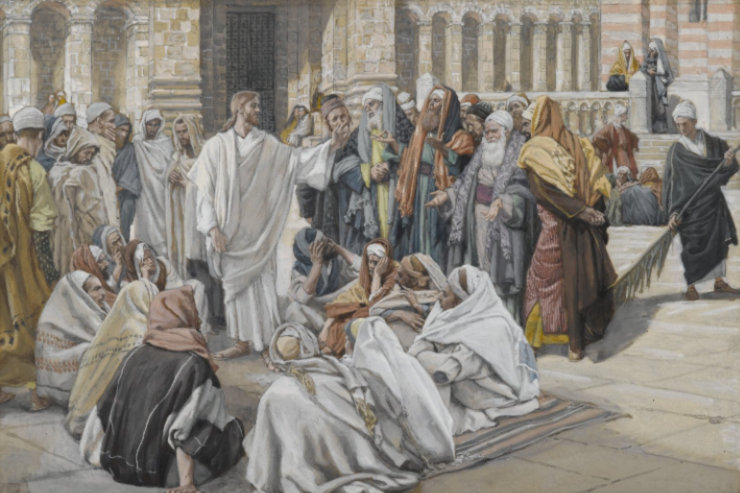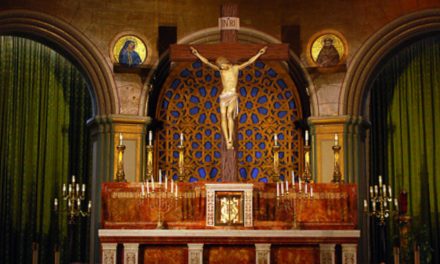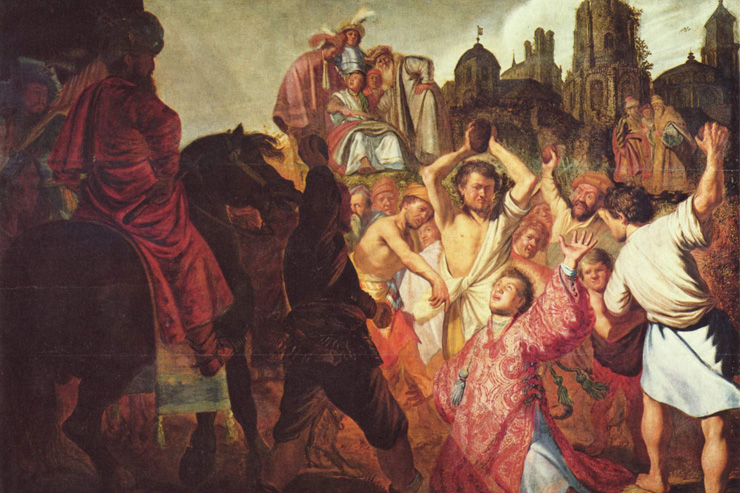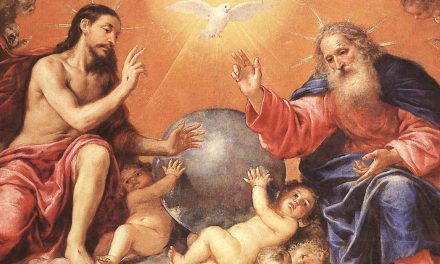Have you ever felt like you have arrived in the middle of a conversation? That’s how you should feel after hearing today’s passage from Mark’s Gospel. But you might not realize it!
What is the First and Greatest Commandment?
The passage begins with the twenty-eighth verse of the twelfth chapter of Mark’s Gospel, but part of the verse was omitted. The full verse reads, “One of the scribes, when he came forward and heard them disputing and saw how well he had answered them, asked him, ‘Which is the first of all the commandments?’”
The key phrase that was not read describes the attitude of the scribe. All through Mark’s gospel up to this point, the Pharisees, Sadducees, and Scribes have been trying to trip Jesus up with trick questions, but not this man. This man has been listening to these exchanges and Mark says that the scribe was impressed with how well Jesus answered the disputes.
This scribe wasn’t playing a game, he wasn’t focused on how to discredit Jesus. He was actually listening, probably because he was an honest seeker of truth. And so he asks the Lord a question that was at the very center of what it meant to be Jewish. He asked about the greatest commandment, and as we will see, particularly whether acts of sacrifice under the law or acts of love were greater.
Shema Yisra’el
One of the most important prayers and the oldest fixed prayer in Judaism, recited morning and evening, is the Shema. The first part of the prayer begins, “Shema Yisra’el” – which means Hear, Israel, and is taken in part from our first reading today in Deuteronomy.
Hear, Israel, the Lord is our God, the Lord is One.
(Blessed be the Name of His glorious kingdom for ever and ever.)
And you shall love the Lord your God with all your heart and with all your soul and with all your might.
Jesus tells the scribe that this commandment, from the opening of the Shema, is the great commandment. But, Jesus adds the words, “with all your mind” to this commandment also ties another commandment closely to it—He says that you must also love your neighbor as yourself.
So, here’s a question for each of us, “Are we listening to the Lord?” He says that the first and greatest commandment is to “love the Lord your God with all your heart, with all your soul, with all your mind, and with all your strength” acknowledging that our God is One and there is no other. How well do we keep these two commandments?
Nothing Held Back
In four ways, Jesus describes our obligation and duty to God.
- First, Jesus describes the heart which, for the Jew, is the seat of life—moral, spiritual and physical. Jesus says that we are to give all of what comes from the heart, first to God.
- Second, Jesus mentions the soul which is even more encompassing of life. The soul of a human is a spiritual soul that will live forever, even after the body has decayed. This too, we are to give first and foremost to God alone.
- Third, Jesus refers to the mind. Alone among creatures, the human being has a rational mind, capable of thought, reason and self-awareness. This great gift from God must also, first serve, and be given by us to, God alone.
- And lastly, Jesus mentions our strength. We humans are composed of body and soul. The moral, spiritual and intellectual activity of a person must manifest in the body. Just as our God entered history and became man—what we call the Incarnation—so too must our faith and love of God incarnate in our bodies.
This great commandment covers the first three of the Ten Commandments. The commandment to love your neighbor as yourself covers the final seven and is also indicated by the Lord’s instruction to love God with all your strength.
Who We Are and How We Live
What we do should be guided by who we are. How we behave should be guided by what we believe. If we love God who loves us, we must also love one another. If we truly love our neighbor, that love will flow from our love of God. All that we do must flow from the love of God in the inner person.
Theophylact of Orchid, an Eastern archbishop and scripture commentator, wrote, “For he who loves God, loves also His creature; but the chief of His creatures is man, wherefore he who loves God ought to love all men. But he who loves his neighbor, who so often offends him, ought much more to love Him [God], who is ever giving him benefits.”
The scribe’s response to Jesus indicates that he understood that acts of love are greater than the law’s acts of sacrifice in and outside of the temple. Jesus told him that he was very close to the Kingdom. What remained I believe was to recognize in Jesus the visitation of God among his people and therefore to love the Son as God who is the way to the Father. The same is true for us.
Being Honest with Yourself
When we examine how we live, our sins of commission and omission need to be viewed in relation to these two great commandments. We need to be intentional in our response to the Lord’s teaching. You need to honestly identify any and all obstacles you place or allow to remain between God and yourself… as do I.
When was the last time you confessed that you failed to love God with all your heart, soul, mind and strength? When was the last time you confessed that you failed to love your neighbor as yourself
Jesus has stated unequivocally, that God alone must be first in our lives and that we must love others as we love oneself. Just imagine a world in which all of God’s children followed these two commands. How glorious that would be!
In closing, here is a wonderful prayer called the Suscipe by St. Ignatius of Loyola.
Receive, Lord, all of my liberty.
Accept the whole of my memory,
my intellect and my will.
Whatever I have or possess,
it was you who gave it to me;
I restore it to you in full,
and I surrender it completely
to the guidance of your will.
Give me only love of you
together with your grace,
and I am rich enough
and ask for nothing more.
Amen
Into the deep…
The readings at Mass for the Thirty-First Sunday Ordinary Time (Year B) are Deuteronomy 6:2-6; Psalms 18:2-3, 3-4, 47, 57; Hebrews 7:23-28; Mark 12:28-34.
Image: “The Pharisees Question Jesus” by James Tissot | Public Domain via Wikimedia Commons.














